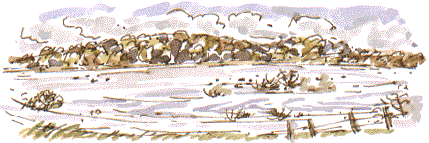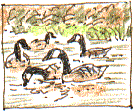Calder Valley FloodsMonday, 6th November 2000, West Yorkshire |
![]()
![]()
![]()
![]()
![]() Nature
Diary Rocks
History
Workshop
Links
Home Page
Nature
Diary Rocks
History
Workshop
Links
Home Page
![]()
 THERE'S A BREAK in the rain this afternoon, so we take the lane from Horbury down to Dudfleet to take a look at the progress of the floods. A turning van creates a miniature tidal wave as we teeter along the edge of the shallow water that covers a factory car park.
THERE'S A BREAK in the rain this afternoon, so we take the lane from Horbury down to Dudfleet to take a look at the progress of the floods. A turning van creates a miniature tidal wave as we teeter along the edge of the shallow water that covers a factory car park.'You're not going far today then?' says the man at the loading bay.
'The canal and the towpath are all one,' a walker warns us, 'I had to scramble through the bramble bushes to get up on the railway.'
Despite these hints, nothing could have prepared us for the sight that opens up as we climb onto the flood barrier. We'd normally overlook a bend in the river with a marshy field - the Wyke - on the far side stretching towards the canal, which is hidden amongst the trees at the foot of Hartley Bank, a quarter of a mile away. Today it has become a continuous sheet of water, as wide as the nature reserve lake at Pugneys Country Park a few miles downstream.

The course of the river is marked by a broken line of trees sticking up from the flood waters. Mallards, Canada Geese and Wigeon swim where cattle grazed in the summer.
 Unable to follow the riverside track, we climb through a gap in a fence and make our way to the embankment of a disused mineral railway which takes us across from the river to the canal. Today it's like walking along a promenade. The marshy field to our right, the Strands, has, like the Wyke been transformed into what looks like a wildfowl refuge with ducks and gulls and a couple of
Unable to follow the riverside track, we climb through a gap in a fence and make our way to the embankment of a disused mineral railway which takes us across from the river to the canal. Today it's like walking along a promenade. The marshy field to our right, the Strands, has, like the Wyke been transformed into what looks like a wildfowl refuge with ducks and gulls and a couple of  Herons standing at the edge of the flood. The Strands is below river level, protected, for the moment, from inundation by a floodbank but in places water is starting to cascade in little rivulets down the banking. A scale attached under the bridge indicates the river is at 3.6 metres, which presumably means above normal level.
Herons standing at the edge of the flood. The Strands is below river level, protected, for the moment, from inundation by a floodbank but in places water is starting to cascade in little rivulets down the banking. A scale attached under the bridge indicates the river is at 3.6 metres, which presumably means above normal level.A lone riverside house, which I believe was originally a lock-keeper's cottage, stands on a slight rise, now an isolated island, above the waters, but a caravan in the garden is half submerged. It reminds me of Venice.
I've never seen floods here on this scale and the impression will last a lifetime. It's an almost dreamlike, surreal experience to see such a familiar landscape so totally transformed. In addition to ourselves there are several groups of people who've made the walk down here to see the spectacle.
There's hush over the landscape - waterscape I should say - which is in eerie contrast the feeling of tremendous natural power that we get as we watch the rush of the swollen river and the swirling progress of water from level to level in the fields around us. A powerful rush of water drains through a culvert beneath the railway.
I get an uneasy feeling that our familiar world has been tilted out of balance, that the floodwaters have some symbolic significance; an ending of things perhaps, or a new beginning.




I was premature to call last Thursday's diary 'as wet as it gets'. Some fences in the valley have now disappeared below the floodwaters.
![]()
Richard Bell,
wildlife illustrator
E-mail; 'richard@willowisland.co.uk'
![]() Next page
Previous page
This day last year
Nature Diary
Home Page
Next page
Previous page
This day last year
Nature Diary
Home Page
![]()